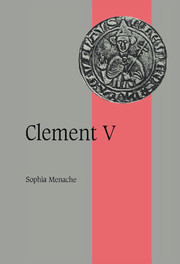Afterword
Published online by Cambridge University Press: 04 December 2009
Summary
Clement V's important achievement, the Clementinae, faithfully reflects his awareness of the dilemmas facing the Christian polity and body, and the pope's attempt to find a compromise between opposing tendencies both inside and outside the Church. Clement learned the lessons of the pontificate of Boniface VIII and, instead of fighting a hopeless battle against secular princes without being assured of the clergy's support, joined forces with the western kings in an attempt to safeguard the papal monarchy. This tendency became most evident in England and France, where Clement's policy reveals itself as a logical reaction to the limitations posed by the emergence of the national state. In this regard, Clement V paved the way for the papacy in the modern era, when ecclesiastical prerogatives became the subject of ever more painful bargaining between the king and the clergy, and between them both and the pope. From an ecclesiastical perspective, however, the consequences of Clements alliance with the kings of France and England were hardly satisfactory. Papal taxation covered the growing needs of royal treasuries while papal provisions became a convenient compensation for royal clerks. The curia thus lost both income from and influence in the national Churches. Moreover, the growing resentment of the kings' policies of centralisation was easily diverted towards the pope, who offered a convenient target for royal propaganda.
Clement's notorious nepotism, as well, offered a ready target, easily manipulated by his opponents. The constant feeling of being on the verge of death – with cancer affecting the pope's proper functioning throughout his nine-year pontificate – encouraged Clement to favour his relatives, friends, and the whole area of Gascony, where he was born, educated, and schooled in the the first stages of a successful ecclesiastical career.
- Type
- Chapter
- Information
- Clement V , pp. 306 - 308Publisher: Cambridge University PressPrint publication year: 1998



